

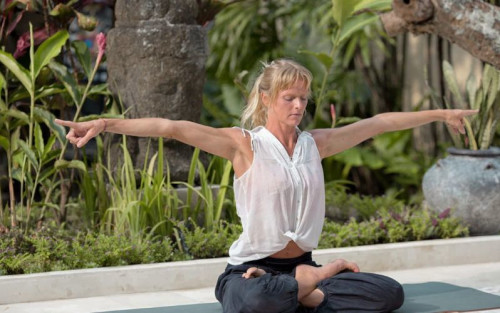

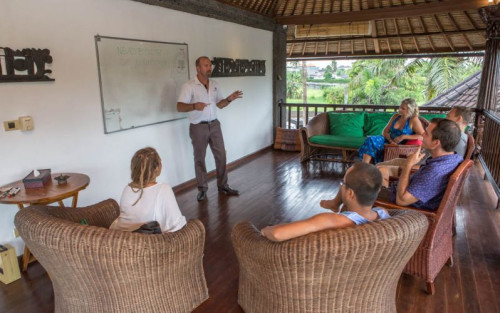




Sivana Bali
Verified Center
This provider's information has been quality-checked by Recovery.com's Research Team for accuracy and completeness, including center verification through appropriate third-party organizations.
Treatment Focus
This center treats substance use disorders and co-occurring mental health conditions. Your treatment plan addresses each condition at once with personalized, compassionate care for comprehensive healing.
Primary Level of Care
Offering intensive care with 24/7 monitoring, residential treatment is typically 30 days and can cover multiple levels of care. Length can range from 14 to 90 days typically.
Treatment Focus
This center treats substance use disorders and co-occurring mental health conditions. Your treatment plan addresses each condition at once with personalized, compassionate care for comprehensive healing.
Primary Level of Care
Offering intensive care with 24/7 monitoring, residential treatment is typically 30 days and can cover multiple levels of care. Length can range from 14 to 90 days typically.
Private Pay
You pay directly for treatment out of pocket. This approach can offer enhanced privacy and flexibility, without involving insurance. Exact costs vary based on program and length of stay. Contact the center for specific details.
Sivana Bali
Sivana Bali
About Sivana Bali
Sivana Bali is a resort-like residential facility designed to treat addiction and co-occurring disorders such as anxiety, depression, mood disorders, and unresolved trauma. Located in a tranquil coastal village near iconic beaches, Sivana offers high-quality integrated care at an exceptional value. With only 9 clients at a time, staff are able to provide clients with tailored treatment plans, unparalleled focus, and absolute privacy during their 28-, 60-, or 90-day programme.
Follow a Personalised Recovery Path
Sivana Bali integrates the benefits of conventional, evidence-based treatment with alternative therapies to address the whole person and reignite a passion for life. In individual and group therapy sessions, clients explore the roots of their addiction, process trauma, challenge negative thought patterns, and learn to manage distress and impulsivity. Clients are also equipped with practical life skills, confidence-building exposure to potential triggers, 12-Step work, and medication, if needed.
Settle into a Private, Tropical Resort
Sivana’s private, resort-style complex features two pools surrounded by lush gardens and rice paddies. Individual rooms offer exquisite bedding, ensuite bathrooms, and workspaces. Chefs prepare mouth-watering meals tailored to each client’s tastes. During downtime, clients can swim, surf, walk, take guided cultural excursions, or keep in touch with work. Arrival is made easy with an airport greeting, assistance through immigration, and private transport to Sivana.
Sustain Positive Change with Aftercare
Working with Sivana’s clinical team, each client develops a comprehensive exit and relapse prevention plan, equipping them with the tools they need to stay strong. Where possible, Sivana provides connections to physical health, mental health, and community resources, including financial planning, parenting support, relationship counselling, employment assistance, and legal services.

Center Overview
Treatment Focus
This center treats substance use disorders and co-occurring mental health conditions. Your treatment plan addresses each condition at once with personalized, compassionate care for comprehensive healing.

Sivana Bali
Pricing and Program Length
Estimated Center Costs
The cost listed here ($10,000 USD), is an estimate of program cost. Center price can vary based on program and length of stay. Contact the center for more information. Recovery.com strives for price transparency so you can make an informed decision.




Recovery.com Verified Listing
Recovery.com verified that the name, location, contact information and license to operate for this treatment provider are valid and up-to-date.

Licensed
Recovery.com is an independent, third-party mental health resource. Verification does not imply endorsement and does not guarantee the quality of treatment services.
Meet Your Care Team

Paul Tanner
Clinical Director

Peter Alderman
Program Manager
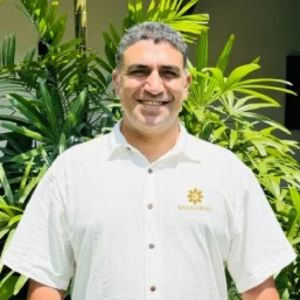
Gary Morton
Senior Recovery Coach
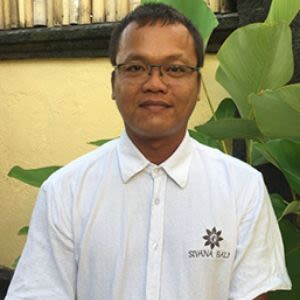
Nanul Prasetyo
Recovery Coach
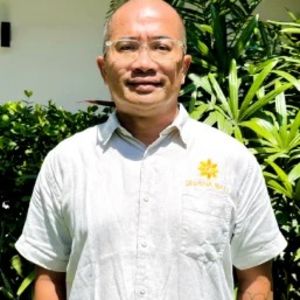
Patrician Gregorius Hutabarat - Ucok
Recovery Coach

Dwitawidya Oktabriani - Brian
Head Nurse
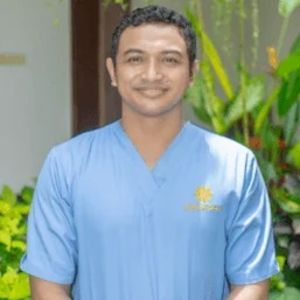
Gede Adipati Alit Srutasena Arwita - Gede
Nurse

Nurse Magdalena Silvina – Silvi
Nurse

I Gusti Ngurah Hardianata - Hardi
Nurse
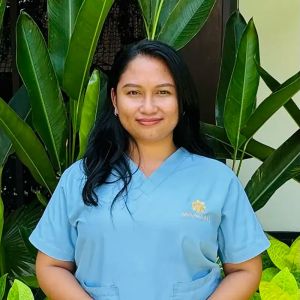
Ni Kadek Chandra Ayu Sarining Merta – Chand
Nurse

I Gede Wiguna Arta Giri
Facility Manager

Ni Putu Sulistyarini – Sulis
Office Manager

I Wayan Miarta
Chef

I Made Edi Antara – Regen
Driver

Danijela Ilic
Reiki and Yoga

Vanessa Bachmann
Reiki and Yoga
Your Care Options
Specializations
Alcohol
Using alcohol as a coping mechanism, or drinking excessively throughout the week, signals an alcohol use disorder.
Anxiety
Anxiety is a common mental health condition that can include excessive worry, panic attacks, physical tension, and increased blood pressure.
Detox
Detox fully and safely removes toxic substances from the body, allowing the next steps in treatment to begin with a clean slate.
Benzodiazepines
Benzodiazepines are prescribed to treat anxiety and sleep issues. They are highly habit forming, and their abuse can cause mood changes and poor judgement.
Cocaine
Cocaine is a stimulant with euphoric effects. Agitation, muscle ticks, psychosis, and heart issues are common symptoms of cocaine abuse.
Depression
Symptoms of depression may include fatigue, a sense of numbness, and loss of interest in activities. This condition can range from mild to severe.
Trauma
Some traumatic events are so disturbing that they cause long-term mental health problems. Those ongoing issues can also be referred to as "trauma."
Who We Treat
Executives
Executive treatment programs typically directly support the needs of people who manage businesses and may provide flexible schedules and office space to allow work during treatment.
Treatment Services
Detox
Detox fully and safely removes toxic substances from the body, allowing the next steps in treatment to begin with a clean slate.
Residential
In a residential rehab program, patients live onsite, with access to daily treatment and 24-hour care. An average stay is 30-90 days.
Approaches
Evidence-Based
A combination of scientifically rooted therapies and treatments make up evidence-based care, defined by their measured and proven results.
Family Involvement
Providers involve family in the treatment of their loved one through family therapy, visits, or both–because addiction is a family disease.
Individual Treatment
Individual care meets the needs of each patient, using personalized treatment to provide them the most relevant care and greatest chance of success.
Medical
Medical addiction treatment uses approved medications to manage withdrawals and cravings, and to treat contributing mental health conditions.
Therapies
1-on-1 Counseling
Patient and therapist meet 1-on-1 to work through difficult emotions and behavioral challenges in a personal, private setting.
Meditation & Mindfulness
A practiced state of mind that brings patients to the present. It allows them to become fully aware of themselves, their feelings, and the present moment.
Art Therapy
Visual art invites patients to examine the emotions within their work, focusing on the process of creativity and its gentle therapeutic power.
Family Therapy
Family therapy addresses group dynamics within a family system, with a focus on improving communication and interrupting unhealthy relationship patterns.
Interpersonal Therapy
This brief and structured therapy addresses present relationships and improves overall communication at work, home, and other social settings.
Life Skills
Teaching life skills like cooking, cleaning, clear communication, and even basic math provides a strong foundation for continued recovery.
Massage Therapy
Massage therapy relieves physical and emotional tension, reduces pain, promotes relaxation, and improves emotion regulation.
Meaning-Centered Therapy
Believing meaning and purpose can ease suffering and inspire change, this therapy connects patients to their spiritual and creative values.
Conditions We Treat
Pornography Addiction
A person with a porn addiction is emotionally dependent on pornography to the point that it interferes with their daily life and relationships.
Grief and Loss
Grief is a natural reaction to loss, but severe grief can interfere with your ability to function. You can get treatment for this condition.
ADHD, ADD
ADHD is a common mental health condition caused by dopamine imbalance. Common symptoms include inattention, hyperactivitiy, and impulsivity.
Anxiety
Anxiety is a common mental health condition that can include excessive worry, panic attacks, physical tension, and increased blood pressure.
Burnout
Burnout entails mental and physical exhaustion, and leads to a severe lack of fulfillment. This condition is often caused by overwork.
Codependency
Codependency is a pattern of emotional dependence and controlling behavior. It's most common among people with addicted loved ones.
Depression
Symptoms of depression may include fatigue, a sense of numbness, and loss of interest in activities. This condition can range from mild to severe.
Eating Disorders
An eating disorder is a long-term pattern of unhealthy behavior relating to food. Most people with eating disorders have a distorted self-image.
Gambling
Excessive, repetitive gambling causes financial and interpersonal problems. This addiction can interfere with work, friendships, and familial relationships.
Substances We Treat
Alcohol
Using alcohol as a coping mechanism, or drinking excessively throughout the week, signals an alcohol use disorder.
Benzodiazepines
Benzodiazepines are prescribed to treat anxiety and sleep issues. They are highly habit forming, and their abuse can cause mood changes and poor judgement.
Chronic Relapse
Consistent relapse occurs repeatedly, after partial recovery from addiction. This condition requires long-term treatment.
Co-Occurring Disorders
A person with multiple mental health diagnoses, such as addiction and depression, has co-occurring disorders also called dual diagnosis.
Cocaine
Cocaine is a stimulant with euphoric effects. Agitation, muscle ticks, psychosis, and heart issues are common symptoms of cocaine abuse.
Drug Addiction
Drug addiction is the excessive and repetitive use of substances, despite harmful consequences to a person's life, health, and relationships.
Ecstasy
Ecstasy is a stimulant that causes intense euphoria and heightened awareness. Abuse of this drug can trigger depression, insomnia, and memory problems.
Heroin
Heroin is a highly addictive and illegal opioid. It can cause insomnia, collapsed veins, heart issues, and additional mental health issues.
Psychedelics
Hallucinogenic drugs—like LSD—cause euphoria and increased sensory experiences. When abused, they can lead to depression and psychosis.
Languages
Aftercare
Care Designed for Your Needs
Personal Amenities
Amenities
Special Considerations
Transition Program
Patients in a transition program gradually return to life outside treatment, helping lower chances of relapse and continue care in a less intense setting.
Executive Program
Addiction and mental health treatment for executives typically involves high discretion, greater technology access, and more private, 1-on-1 care.
Activities
Yoga
Yoga is both a physical and spiritual practice. It includes a flow of movement, breathing techniques, and meditation.
Off-Site Activities
Yoga
Yoga is both a physical and spiritual practice. It includes a flow of movement, breathing techniques, and meditation.
Off-Site Amenities
Learn More About the Center
Sivana’s Schedule
Look at a representation of what Sivana Bali’s individualised programs include daily and weekly.
Rebuilding Trust After Addiction
Discover a relationship roadmap with practical steps to help rebuild stronger than ever.
What Does Alcohol Withdrawal Feel Like?
Learn common symptoms, duration, and other things to expect when going through withdrawal.
Benefits of Trauma Therapy
Find out how trauma-informed therapy aids recovery from addiction.
What people are saying
Treatment
4.8
Accommodations
4.7
Food & Nutrition
4.9
Value
4.8
Pros
- Beautiful Location (6)
- Excellent & Effective Treatment Programming (6)
- Friendly & Competent Staff (6)
- Treated With Respect (6)
Cons
- Limited Time to Work (2)
BB
Treatment in 2022 • (45 days) • Reviewed 02/27/24
Former Client
•Self-employed
Michel
Treatment in 2022 • (60 days) • Reviewed 09/20/22
Former Client
•Professional
•USA
Carlo LM
Reviewed 09/16/22
Referring Professional
•Service provider/Recovery coach
Dean
Treatment in 2018 • (60 days) • Reviewed 09/15/22
Former Client
•Boilermaker
•Western Australia
Sarah
Treatment in 2022 • (180+ days) • Reviewed 09/15/22
Former Client
•Teacher
•America





